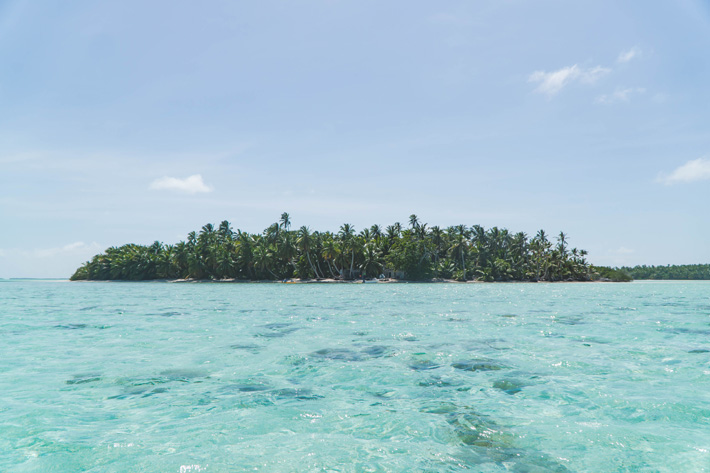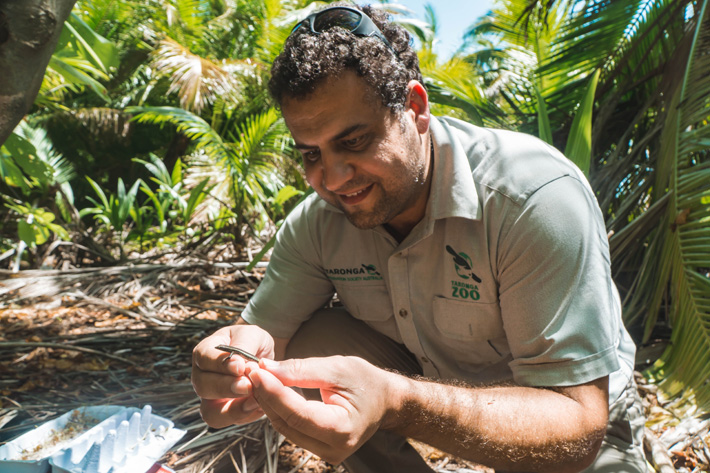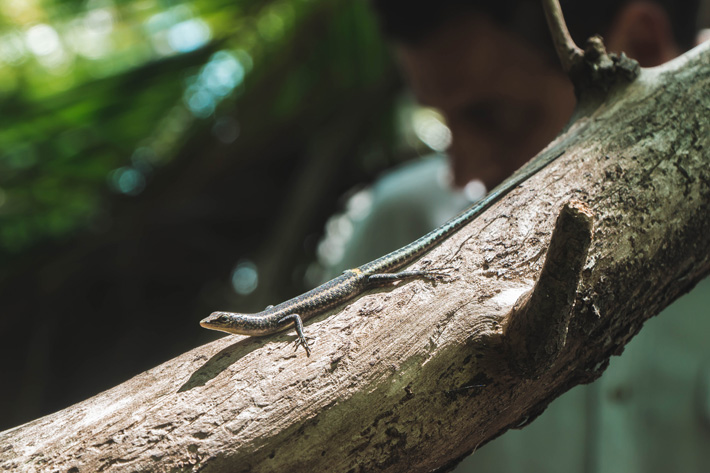Posted on 12th September 2019 by Media Relations
The critically endangered Christmas Island blue-tailed skink was released back into the wild following a hugely successful decade-long captive breeding program.
The 300 blue-tailed skinks now call Pulu Blan, a tiny island in the Cocos (Keeling) Islands archipelago, home. Half the skinks were transported from Christmas Island National Park, while the other half made a 6000km journey from Taronga Zoo in Sydney, in the main cabin of a Virgin Australia aircraft.

Minister for the Environment Sussan Ley said the first 150 skinks were released on to the island on Threatened Species Day (7 September 2019), after their incredible journey. The skinks were then joined by a further 150 skinks from Christmas Island National Park’s population.
“The trial release of Christmas Island blue-tailed skinks into the wild is the culmination of 10 years of work led by Parks Australia and supported by many fantastic partners,” Minister Ley said.
“Without Parks Australia’s dedicated staff on Christmas Island this beautiful species would now be extinct. Instead we have two healthy populations that have been bred in captivity – one on Christmas Island and one at Taronga Zoo in Sydney. Now we’ve taken the next step on the path to survival - a translocation into a wild setting to help safeguard the Christmas Island blue-tailed skink from extinction.”
Christmas Island National Park ranger Brendan Tiernan was part of the rescue mission in 2009 and 2010 that saved 66 skinks before the population was wiped out. It’s these skinks that formed the basis for two populations succesfully bred in captivity.
“We hope to provide a safe refuge for this beautiful species outside of captivity and away from introduced predators like wolf snakes, giant centipedes, rats and cats that decimated the species on Christmas Island,” Mr Tiernan said.
Taronga Conservation Society Australia spokesperson, Michael McFadden, said Taronga has worked with Parks Australia on the recovery of the species for nine years, breeding a separate insurance population of skinks in Sydney.
“We were really happy to be able to collaborate with Parks Australia on this project, and are pleased the success of the program has led to an attempt to re-establish the species in a wild environment,” Mr McFadden said.
“This is another example of how Taronga is committed to the conservation of wildlife in Australia and around the world.”

Getting the skinks from Taronga Zoo in Sydney to the Cocos Islands was made possible by Virgin Australia, the only Australian airline to fly to the Cocos Islands. Virgin safely transported the skinks in the main cabin, to the remote island refuge 3000 km north west of Perth in the Indian Ocean.
Virgin Australia Cargo General Manager, Glen Moloney, said Virgin has moved some unique cargo including lions, hippos, African wild dogs and Tasmanian devils, but reptiles in the main cabin is a Virgin Australia first.
“It was a delight having them onboard. They were extremely well behaved guests and we’re pleased to support this conservation initiative,” Mr Moloney continued.
There have been many supporters who have helped this species survive. World-leading reptile experts and scientists have provided advice throughout this project and have supported the blue-tailed skinks in their survival.
The University of Western Australia and the University of Sydney have also both provided tremendous ongoing support for this project along with the National Environmental Science Programme.
